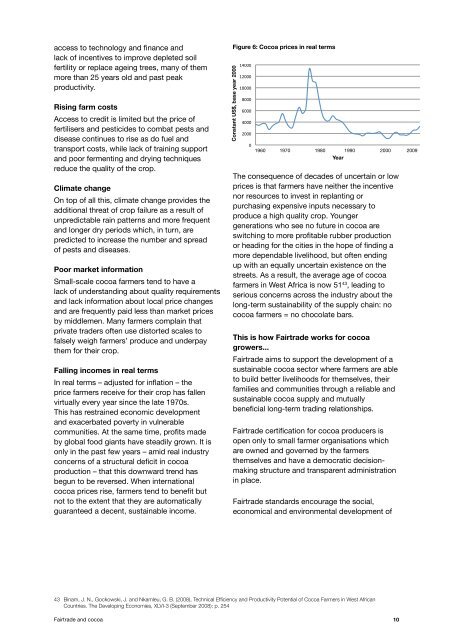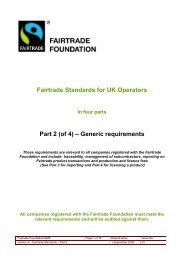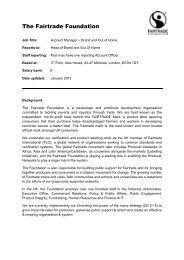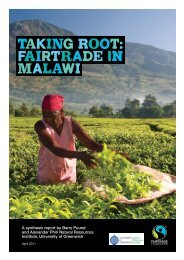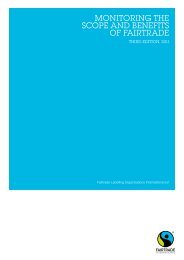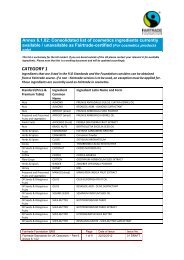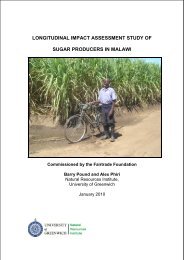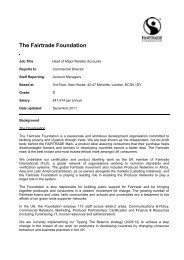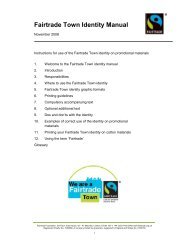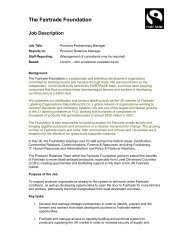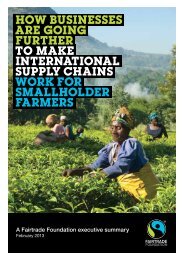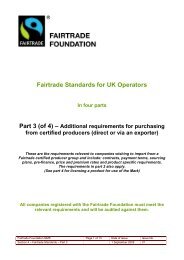Fairtrade and cocoa - The Fairtrade Foundation
Fairtrade and cocoa - The Fairtrade Foundation
Fairtrade and cocoa - The Fairtrade Foundation
You also want an ePaper? Increase the reach of your titles
YUMPU automatically turns print PDFs into web optimized ePapers that Google loves.
access to technology <strong>and</strong> finance <strong>and</strong><br />
lack of incentives to improve depleted soil<br />
fertility or replace ageing trees, many of them<br />
more than 25 years old <strong>and</strong> past peak<br />
productivity.<br />
Rising farm costs<br />
Access to credit is limited but the price of<br />
fertilisers <strong>and</strong> pesticides to combat pests <strong>and</strong><br />
disease continues to rise as do fuel <strong>and</strong><br />
transport costs, while lack of training support<br />
<strong>and</strong> poor fermenting <strong>and</strong> drying techniques<br />
reduce the quality of the crop.<br />
Climate change<br />
On top of all this, climate change provides the<br />
additional threat of crop failure as a result of<br />
unpredictable rain patterns <strong>and</strong> more frequent<br />
<strong>and</strong> longer dry periods which, in turn, are<br />
predicted to increase the number <strong>and</strong> spread<br />
of pests <strong>and</strong> diseases.<br />
Poor market information<br />
Small-scale <strong>cocoa</strong> farmers tend to have a<br />
lack of underst<strong>and</strong>ing about quality requirements<br />
<strong>and</strong> lack information about local price changes<br />
<strong>and</strong> are frequently paid less than market prices<br />
by middlemen. Many farmers complain that<br />
private traders often use distorted scales to<br />
falsely weigh farmers’ produce <strong>and</strong> underpay<br />
them for their crop.<br />
Falling incomes in real terms<br />
In real terms – adjusted for inflation – the<br />
price farmers receive for their crop has fallen<br />
virtually every year since the late 1970s.<br />
This has restrained economic development<br />
<strong>and</strong> exacerbated poverty in vulnerable<br />
communities. At the same time, profits made<br />
by global food giants have steadily grown. It is<br />
only in the past few years – amid real industry<br />
concerns of a structural deficit in <strong>cocoa</strong><br />
production – that this downward trend has<br />
begun to be reversed. When international<br />
<strong>cocoa</strong> prices rise, farmers tend to benefit but<br />
not to the extent that they are automatically<br />
guaranteed a decent, sustainable income.<br />
<strong>Fairtrade</strong> <strong>and</strong> <strong>cocoa</strong><br />
Price Constant in constant US$, base year 2000<br />
Figure 6: Cocoa prices in real terms<br />
14000<br />
12000<br />
10000<br />
8000<br />
6000<br />
4000<br />
2000<br />
Global <strong>cocoa</strong> prices in real terms<br />
0<br />
1960/61 1960 1970/71 1970<br />
1980/81<br />
1980 1990/91 1990 2000/01 2000 2009/10 2009<br />
CropYear Year<br />
<strong>The</strong> consequence of decades of uncertain or low<br />
prices is that farmers have neither the incentive<br />
nor resources to invest in replanting or<br />
purchasing expensive inputs necessary to<br />
produce a high quality crop. Younger<br />
generations who see no future in <strong>cocoa</strong> are<br />
switching to more profitable rubber production<br />
or heading for the cities in the hope of finding a<br />
more dependable livelihood, but often ending<br />
up with an equally uncertain existence on the<br />
streets. As a result, the average age of <strong>cocoa</strong><br />
farmers in West Africa is now 51 43 , leading to<br />
serious concerns across the industry about the<br />
long-term sustainability of the supply chain: no<br />
<strong>cocoa</strong> farmers = no chocolate bars.<br />
This is how <strong>Fairtrade</strong> works for <strong>cocoa</strong><br />
growers...<br />
<strong>Fairtrade</strong> aims to support the development of a<br />
sustainable <strong>cocoa</strong> sector where farmers are able<br />
to build better livelihoods for themselves, their<br />
families <strong>and</strong> communities through a reliable <strong>and</strong><br />
sustainable <strong>cocoa</strong> supply <strong>and</strong> mutually<br />
beneficial long-term trading relationships.<br />
<strong>Fairtrade</strong> certification for <strong>cocoa</strong> producers is<br />
open only to small farmer organisations which<br />
are owned <strong>and</strong> governed by the farmers<br />
themselves <strong>and</strong> have a democratic decisionmaking<br />
structure <strong>and</strong> transparent administration<br />
in place.<br />
<strong>Fairtrade</strong> st<strong>and</strong>ards encourage the social,<br />
economical <strong>and</strong> environmental development of<br />
43 Binam, J. N., Gockowski, J. <strong>and</strong> Nkamleu, G. B. (2008), Technical Efficiency <strong>and</strong> Productivity Potential of Cocoa Farmers in West African<br />
Countries. <strong>The</strong> Developing Economies, XLVI-3 (September 2008): p. 254<br />
10


